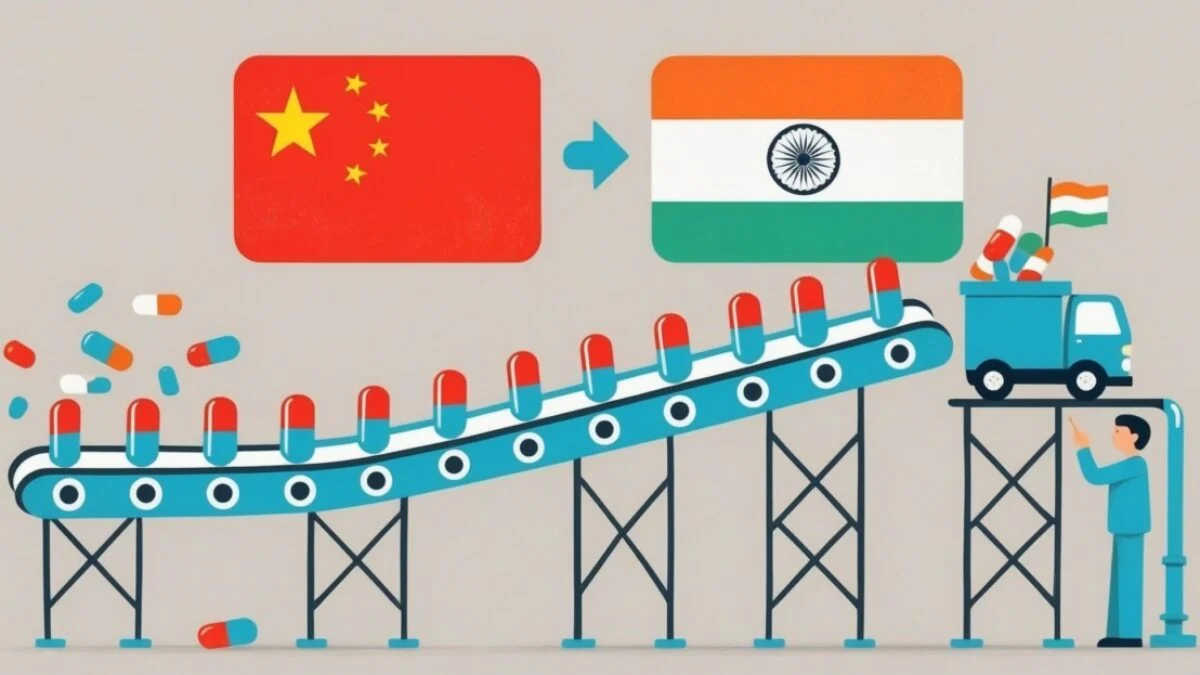Introduction: The US Biosecure Act and its Global Ramifications
The recently enacted US Biosecure Act has sent ripples through the global pharmaceutical industry, particularly affecting China and India. While China’s dominant position in pharmaceutical exports faces unprecedented challenges due to this legislation, India stands poised to benefit, with projections indicating that its pharma contract manufacturing sector could double in size over the next three years.
The US Biosecure Act targets China, as it aims at bolstering national security and safeguarding public health, imposes stringent new requirements on the sourcing of critical medical supplies and pharmaceuticals. The primary intent is to reduce reliance on foreign entities—most notably China—by encouraging domestic production and forging stronger ties with trusted international partners. India, with its established pharmaceutical infrastructure, emerges as a key beneficiary of this policy shift.
The US Biosecure Act Targets China’s Pharmaceutical Industry
For decades, China has been a leading supplier of active pharmaceutical ingredients (APIs) and finished drug products to the United States and other global markets. However, the US Biosecure Act introduces a new era of scrutiny and regulation that threatens to disrupt this status quo. The US Biosecure Act targets China’s pharmaceutical industry as it mandates that critical drugs and medical supplies must be sourced from countries deemed secure and trustworthy. This indirectly sidelines Chinese manufacturers and impacts China’s pharmaceutical industry.
This move is seen as a strategic effort by the US government to reduce dependency on China, a country that has faced increasing scrutiny over its trade practices, intellectual property rights issues, and geopolitical tensions. The potential impact on China’s pharmaceutical exports is profound, with many industry experts predicting a significant reduction in its market share over the coming years.
India’s Strategic Positioning in the Global Pharma Landscape
India, often referred to as the ‘Pharmacy of the World,’ is uniquely positioned to capitalize on the opportunities created by the US Biosecure Act. India’s pharmaceutical industry is well-established, with a robust infrastructure capable of meeting global demands. India is already a major player in the production of generic drugs, and India’s pharma contract manufacturing sector is poised for significant growth as global demand shifts away from China.
According to industry projections, India’s pharma contract manufacturing sector could see a doubling of its capacity within the next three years. This growth is fueled by an increasing number of contracts from global pharmaceutical companies looking to diversify their supply chains and reduce reliance on Chinese manufacturers. The Indian government has also been proactive in supporting this growth, offering incentives and simplifying regulations to attract more foreign investment in the pharmaceutical sector.
US Biosecure Act: A Catalyst for Change in Global Pharma Supply Chains
The US Biosecure Act is more than just a piece of legislation; it is a catalyst for a broader reorganization of global pharma supply chains. By prioritizing security and reliability over cost, the Act encourages pharmaceutical companies to reassess their sourcing strategies and seek partnerships with countries that align with the US’s national security interests.
For India, this presents an unprecedented opportunity to expand its influence in the global pharmaceutical market. The country’s expertise in producing high-quality, cost-effective pharmaceutical products makes it an attractive alternative to China. Moreover, India’s long-standing relationship with the US, coupled with its compliance with international quality standards, positions it as a reliable partner in the post-Biosecure Act landscape.
Challenges and Opportunities for India’s Pharma Industry
While the prospects for India’s pharma contract manufacturing sector are promising, there are challenges that need to be addressed to fully capitalize on the opportunities presented by the US Biosecure Act. The industry must invest in scaling up its production capacities, enhancing quality control measures, and ensuring compliance with the stringent regulatory requirements set forth by the US and other global markets.
Additionally, India will need to navigate potential trade barriers and geopolitical considerations as it seeks to expand its footprint in the global pharmaceutical market. The country’s ability to maintain competitive pricing while adhering to the highest quality standards will be critical to its success in securing long-term contracts with global pharmaceutical companies.
On the other hand, the US Biosecure Act also presents an opportunity for India to strengthen its domestic pharmaceutical industry. By focusing on self-reliance and reducing dependence on imports, India can enhance its own healthcare security while also positioning itself as a key player in the global pharmaceutical market.
The Future of Global Pharma Trade Post-US Biosecure Act
As the US Biosecure Act targets China, the global pharmaceutical industry is likely to undergo significant changes. The Act’s emphasis on secure and reliable sourcing will drive a shift away from low-cost suppliers to those that can offer both quality and security. This realignment will have long-lasting implications for global trade, with India emerging as a major beneficiary.
India’s ability to seize this opportunity will depend on its capacity to scale up production, maintain stringent quality controls, and navigate the complex regulatory landscape of global pharma trade. If successful, India could solidify its position as a global pharmaceutical hub, providing a secure and reliable alternative to China.
In conclusion, the US Biosecure Act targets China’s pharma sector and represents a turning point in the global pharmaceutical industry. While China faces challenges due to increased scrutiny and regulation, India stands to gain significantly by expanding its pharma contract manufacturing sector. As the world adapts to the new realities imposed by the Act, India’s role in the global pharmaceutical supply chain is set to grow, offering both challenges and opportunities for the country’s industry.
Conclusion: India’s Path Forward in the Global Pharmaceutical Market
The US Biosecure Act has set the stage for a new era in global pharmaceutical trade. By targeting China and incentivizing alternative sourcing strategies, the Act has opened the door for India to double its pharma contract manufacturing capacity over the next three years. This shift not only strengthens India’s position in the global pharma market but also enhances the country’s own healthcare security.
As India moves forward, it will be essential for the country to continue investing in its pharmaceutical infrastructure, ensuring compliance with international standards, and fostering strong relationships with global partners. The US Biosecure Act may have set the wheels in motion, but India’s success in this new landscape will depend on its ability to rise to the challenges and capitalize on the opportunities presented by this landmark legislation.



